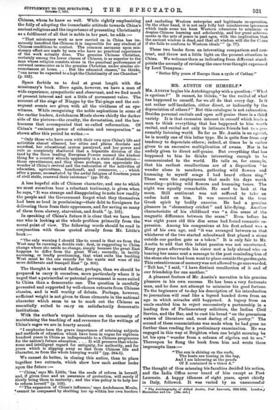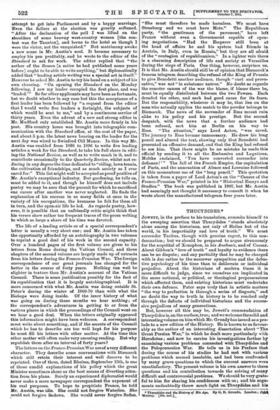MR. AUSTIN ON HIMSELF.*
Ma. AUSTIN begins his Autobiography with a question: " Wh A t is egotism ? " It cannot, he thinks, " be the recital of what has happened to oneself, for we all do that every day. Is it
not rather self-laudation, either direct, or indirectly by the
depreciation of others ? " But this catalogue is not exhaustive. Besides personal recitals and open self-praise there is a third variety, It is that excessive interest in oneself which leaas a man to think everything that has happened to him worth recital, and recital not only to intimate friends but to a pre- sumably listening world. So far as Mr. Austin is an egot ist,
he is mostly one of this latter type. He is quite free from any
tendency to depreciate others ; indeed, at times he is lather given to an excessive multiplication of swans. Nor is ho unduly given to direct self-praise. But everything that has happened to him he thinks interesting enough to be communicated to the world. He tells us, for example,
that his earliest recollections are of a disposition " to wander alone in meadows, gathering wild flowers and bumming to myself songs I had beard others sing." These were the employments that made his days worth recording—picking wild flowers and humming tunes. The
night was equally remarkable. He used to look at the moon. Still sentiment was not suffered to take an undue bold on him. It was corrected in the true Greek spirit by bodily exercise. He bad a genuine pleasure in "elementary cricket" and kite-flying. Another characteristic of bis childhood was "a dim sense of the magnetic difference between the sexes." Even before he was eight years old this dim sense had found romantic ex- pression. Among his companions at his first school was a girl of his own age, and "it was arranged between us that whichever of the two started schoolward first placed a stone
outside our garden gate as a token." It is only fair to Mr. Austin to add that this infant passion was not unreturned.
Many years afterwards his sister met a lady abroad who on hearing her name sent a message to the poet reminding him of the stone she too bad been wont to place outside the garden gate. This retentiveness of memory was not allowed to go unrewarded.
" Tell her," I said, " I have distinct recollection of it and of our friendship for one another."
A pleasant feature of Mr. Austin's narrative is his genuine
pleasure in his own success. He has been a very fortunate man, and he does not attempt to minimize his good fortune. To the beginners of to-day his description of his introduction to journalism will read like a legend handed down from an age in which miracles still happened. A legacy from an uncle enabled him to reject successively a partnership in a leading firm of Parliamentary solicitors, the Indian Civil Service, and the Bar, and to cast his bread "on the precarious waters of literature and, most daring of all, poetry." The
second of these renunciations was made when he bad gone no further than reading for a preliminary examination. He was
engaged in this way at Brighton when one bright morning he let his eyes " wander from a column of algebra out to sea." Thereupon be flung the book from him and wrote these impromptu lines :— " The sun is shining on the roofs, The boats are tossing in the bay, And I am labouring at the proofs Of X contained in n times A."
The thought of thus misusing his faculties decided his action,
and the India Office never heard of him except as Poet Laureate. A. happy idleness of eight years, spent chiefly in Italy, followed. It was varied by an unsuccessfu: • The Autobiovaphy of Alfred Austin, Poet Laursato, 1835-1910. Londol,j Macmillan and Go. [248. net.] attempt to get into Parliament and by a happy marriage. Even the failure at the election was greatly softened. "After the declaration of the poll I was lifted on the shoulders of some brawny west-country women [the con- test was for Taunton], and borne to the hotel as though I were the victor, not the vanquished." But matrimony awoke a new sense in Mr. Austin's soul. It became necessary to employ his pen profitably, and he wrote to the editor of the 'Standard to ask for work. The editor replied that "the author of the Season [a satire he had published some years before] ought to be able to write anything," but diplomatically added that " leading article writing was a special art in itself." However he asked Mr. Austin to try his hand on a subject of his own choosing. "On opening the Standard on the Monday following, I saw my leader occupied the first place, and was 'leaded.'" So far other applicants may have been as fortunate, but we doubt -whether in any case but this the acceptance of a first leader has been followed by "a request from the editor that I would write five leaders a fortnight, the subjects of which would be sent to me," and by a continuous service of thirty years. Even the advent of a new and strong editor in Mr. Mudford only established Mr. Austin more firmly in his post. His country home was brought into telegraphic com- munication with the Standard office, at the cost of the paper, and about 5 p.m. the latest news bearing on the leader for the next day was wired to Swinford Old Manor. In this way Mr. Austin was enabled from 1866 to 1896 to write five leading articles a week for the Standard, to take his full share in edit- ing the National Review, as well as to write much in it, and to contribute occasionally to the Quarterly _Review, whilst not re- ducing in any degree the time dedicated to "riding, lawn tennis, the cultivation of friendships, and as much society as I ever cared for." This list might well be accepted as proof positive of Mr. Austin's exceptional industry. But gardening, he tells us, must be added to it, and though he himself does not include poetry we may be sure that the pursuit for which be sacrificed one career after another was never neglected. He finds the explanation of his success in so many fields at once in the variety of his occupations, the keenness he felt for them all in turn, and the open-air life he led. As regards poetry, how- ever, it is possible that an unfriendly critic might think that his verses show rather too frequent traces of the prose writing to which so large a share of his time was devoted.
The life of a leading article or of a special correspondent's letter is usually a very short one ; and Mr. Austin has taken the opportunity afforded by an autobiography in two volumes to reprint a good deal of his work in the second capacity. Over a hundred pages of the first volume are given to his letters from Rome during the Vatican Council, and three chapters of the second volume are largely made up of extracts from his letters during the Franco-Prussian War. The foreign correspondence of our great journals has changed for the better in the course of forty years. Nothing can well be slighter in texture than Mr. Austin's account of the Vatican Council. There is some justification possibly for the fact of its republication that it is largely autobiographical. It is more concerned with what Mr. Austin was doing outside St. Peter's during the winter of 1869-70 than with what the Bishops were doing inside. Of the inner history of what was going on during these months we hear nothing ; of the correspondent's adventures in getting to or from the various places in which the proceedings of the Council went on we hear a good deal. When the letters originally appeared this information might have been welcome. A correspondent must write about something, and if the secrets of the Council which he has to describe are too well kept for his purpose he must fill his letters with other matter. At the time this other matter will often make very amusing reading. But why republish them after an interval of forty years?
The letters on the Franco-Prussian War are of every different character. They describe some conversations with Bismarck which still retain their interest and well deserve to be reprinted. One of them, dated Rheims, September 13th, is one of those candid explanations of his policy which the great Minister sometimes chose as the best means of diverting atten- tion from his plans. Surely an experienced diplomatist would never make a mere newspaper correspondent the exponent of his real purposes. To hope to propitiate France, he told Mr. Austin, was idle. She could not forgive Waterloo. She could not forgive Sadowa. She would never forgive Sedan. " She must therefore be made harmless. We must have Strasburg and we must have Metz." The Republican party, " the gentlemen of the pavement," have left France without even a Government capable of open- ing negotiations. "Had the Emperor still been at the head of affairs he and his system had friends in Austria, in Italy, even in Russia," but they are all afraid of the "contagion of republicanism." In a lighter vein there is a charming description of life and society at Versailles during the siege of Paris. One thing, however, surprises us. It is that Mr. Austin should still be of opinion that Bismarck's famous telegram describing the refusal of the King of Prussia to give Benedetti another audience, though " curt and provo- cative," was not " in substance untrue." No doubt as regards the remoter causes of the war the blame, if blame there be, must be equally distributed between the two Powers. Each dreaded the other, and each had good cause for its fears. But the responsibility, whatever it may be, that lies on the man who actually applies the match to the powder belongs to Bismarck. The news of the surrender of Ems meant ruin alike to his policy and his prestige. But the second despatch, with the news that a further audience had been refused, met him at Berlin on his way to Ems. " The situation," says Lord Acton, " was saved. The journey to Ems became unnecessary. He drew his long pencil and altered the text, showing only that Benedetti had presented an offensive demand, and that the King had refused to see him. That there might be no mistake he made this official by sending it to all the Embassies and Legations. Moltke exclaimed, You have converted surrender into defiance I ' " The fall of the French Empire, the capitulation of Paris, and the annexation of Alsace and Lorraine followed on this momentous use of the "long pencil" This quotation is taken from a paper of Lord Acton's on the "Causes of the Franco-Prussian War," printed in his "Historical Essays and Studies." The book was published in 1907, but Mr. Austin had seemingly not thought it necessary to consult it when he wrote about the manufactured telegram four years later.































































 Previous page
Previous page